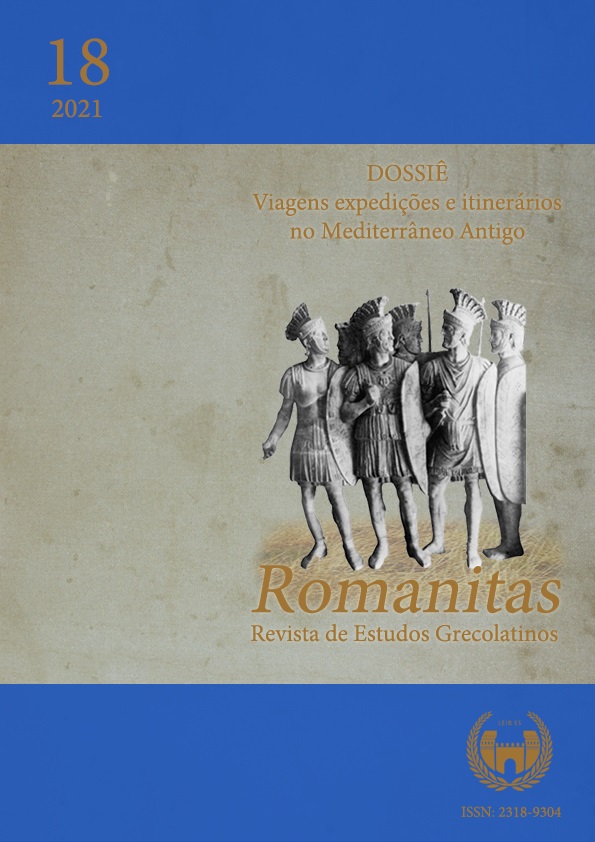The persuasion as an instrument of political action in 5th century B.C. Athens: the case of Pericles
DOI:
https://doi.org/10.17648/rom.v0i18.35825Keywords:
Rhetoric, Thucydides, Pericles, Ancient historiographyAbstract
In the book History of the Peloponnesian War, Thucydides states that Pericles, the eminent Athenian politician, “could contain the crowd without threatening its freedom, and lead it instead of being led by it, as he did not resort to adulation to obtain strength by less worthy means” (Thuc., 2, 65, 8). If Pericles did not use imposition or adulation to govern his fellow citizens, what then was his main instrument of political action? In this article, we will defend the proposition that persuasion was the supreme instrument used by Pericles in conducting his policy among the Athenians. During the analysis of excerpts from Pericles' third speech reported by Thucydides (Thuc., 2, 60-4), four central aspects of how this was configured will be presented.
Downloads
References
Documentação textual
ARISTÓFANES. A Paz. Tradução de Maria de Fátima de Sousa e Silva. Coimbra: Instituto Nacional de Investigação Científica, 1984.
ARISTÓFANES. As Nuvens. Tradução de Mário da Gama Kury. Rio de Janeiro: Jorge Zahar, 1995.
ARISTÓFANES. Os Acarnenses. Tradução de Maria de Fátima de Sousa e Silva. Coimbra: Instituto Nacional de Investigação Científica, 1988.
ARISTÓTELES. Poética. Tradução de Eudoro de Souza. São Paulo: Abril Cultural, 1973.
ARISTÓTELES. Política. Tradução e notas de Maria Aparecida de Oliveira Silva. São Paulo: Edipro, 2019.
ARISTÓTELES. Retórica. Tradução e notas de Manuele Alexandre Júnior, Paulo Farmhouse Alberto e Abel do Nascimento Pena. Lisboa: Imprensa Nacional Casa da Moeda, 1998.
PLATÃO. Górgias. Tradução de Daniel R. N. Lopes. São Paulo: Perspectiva, 2016.
PLATÃO. O Banquete. Tradução de Carlos Alberto Nunes. Belém: Editora da UFPA, 2011.
PLUTARCO. Vidas Paralelas: Péricles e Fábio Máximo. Tradução do grego, introdução e notas de Ana Maria Guedes Ferreira e Ália Rosa Conceição Rodrigues. Coimbra: Imprensa da Universidade de Coimbra, 2013.
SANTO AGOSTINHO. Confissões. Tradução de Lorenzo Mammi. São Paulo: Penguin, 2017.
Obras de apoio
AUSTIN, M.; NAQUET, P. V. Economia e sociedade na Grécia antiga. Lisboa: Edições 70, 1986.
CASTELLS, M. Comunicación y poder. Madrid: Alianza, 2010.
COHEN, D. Justice, interest, and political deliberation in Thucydides. Quaderni Urbinati di Cultura Classica, v. 16, n. 1, p. 35-60, 1984.
HOHLFELDT, A. Hipóteses contemporâneas de pesquisa em comunicação. In: FRANÇA, V.; HOHLFELDT, A.; MARTINHO, L. C. (org.). Teorias da comunicação: conceitos, escolas e tendências. Rio de Janeiro: Vozes, 2001.
LIDDEL, H. G.; SCOTT, R. Greek-English lexicon. Oxford: Clarendon Press, 1996.
LIDDELL HART, B. H. As grandes guerras da História. São Paulo: IBRASA, 1982.
MANUWALD, B. Diodotus' Deceit (On Thucydides 3.42-48). In: RUSTEN, J. S. (ed.). Oxford Readings in Classical Studies: Thucydides. Oxford: Oxford University Press, 2009, p. 241-260.
MOSCA, L. S. Velhas e novas retóricas: convergências e desdobramentos. In: MOSCA, L. S. (org.). Retóricas de ontem e de hoje. São Paulo: Humanitas, 2001.
MOSSÉ, C. As instituições gregas. Lisboa: Edições 70, 1985.
PERELMAN, C; OLBRECHTS-TYTECA, L. Tratado da argumentação. São Paulo: Martins Fontes, 1996.
PLANTIN, C. Não se trata de convencer, mas de conviver: a era pós-persuasão. Revista Eletrônica de Estudos Integrados do Discurso e Argumentação, n. 15, p. 244-269, 2018.
RAAFLAUB, K. A. Ktema es aiei. Thucydides' concept of “learning through history” and its realization in his work. In: TSAKMAKIS, A.; TAMIOLAKI, M. (ed.). Thucydides between History and Literature. Berlin: De Gruyter, 2013, p. 3-21.
RIBEIRO FERREIRA, J. Participação e poder na democracia grega. Coimbra: Faculdade de Letras da Universidade de Coimbra, 1990.
RICOEUR, P. Temps et récit. Paris: Seuil, 1985.
RUSTEN, J. Pericles in Thucydides. In: JIMENEZ, A. P.; FERREIRA, J. R.; FIALHO, M. do C. (org.). O retrato literário e a biografia como estratégia de teorização política. Coimbra: Imprensa da Universidade de Coimbra, 2004.
SANTOS, R. N. dos S. Retratos de um derrotado: Xerxes, o “Grande Rei”. Codex, v. 8, n. 2, p. 171-182, 2020.
SOARES, M. T. M. ‘Ekphrasis’ e ‘enargeia’ na historiografia de Tucídides e no pensamento filosófico de Paul Ricoeur. Talia dixit, v. 6, p. 1-23, 2011.
TUCÍDIDES. História da Guerra do Peloponeso. Tradução e notas de Mario da Gama Kury. Brasília: Editora Universidade de Brasília, 1982.
VERNANT, J. P. As origens do pensamento grego. Rio de Janeiro: Difel, 2002.
VOGT, J. The portrait of Pericles in Thucydides. In: RUSTEN, J. S. (ed.). Oxford Readings in Classical Studies: Thucydides. Oxford University Press, 2009, pp. 220-237.
YUNIS, H. Taming democracy: models of political rhetoric in Classical Athens. Cornell: Cornell University Press, 1996.
Downloads
Published
How to Cite
Issue
Section
License
Copyright (c) 2021 Ricardo Neves dos Santos

This work is licensed under a Creative Commons Attribution-NonCommercial-NoDerivatives 4.0 International License.
a. The authors retain copyright and grant the journal the right to first publication.
b. The authors are authorized to assume additional contracts separately, for non-exclusive distribution of the version of the work published in this journal (e.g., publishing in institutional repository or as a book chapter), with acknowledgment of authorship and initial publication in this journal.
c. Authors are allowed and encouraged to publish and distribute their work online (e.g. in institutional repositories or on their personal page) after the first publication by the journal, with due credit.
d. The journal's texts are licensed under a CC BY 4.0 Deed Attribution 4.0 International Licence (CC BY).




























